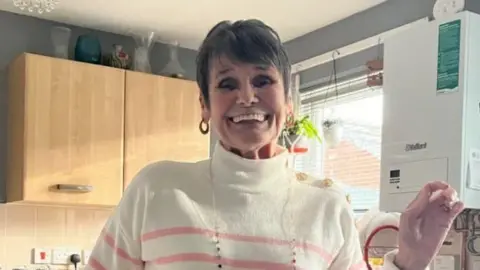In a tragic and shocking incident that has drawn attention and sympathy, Natasha Flynn-Farrell recounted the harrowing experience of witnessing her mother’s murder via a doorbell camera. This life-altering moment came on a fateful night in October 2024 when Dean Mears, a 35-year-old drug dealer, brutally attacked 69-year-old Catherine Flynn in her home located in the seaside town of Rhyl, Denbighshire. The sense of helplessness enveloped Flynn-Farrell as she heard the sounds of the ferocious assault in real-time and was unable to intervene or prevent the impending tragedy.
The details surrounding the crime are chilling. Mears, having consumed a cocktail of substances including ketamine and cannabis, broke into Mrs. Flynn’s home by smashing a window. He proceeded to drag her from her bed before inflicting horrific physical violence upon her, resulting in catastrophic facial injuries that would ultimately claim her life the following day. The attack, described by Judge Rhys Rowlands as “savage” and “merciless,” left every bone in Mrs. Flynn’s face broken, a fact that exacerbates the horror of her suffering during that fateful encounter. A jury found Mears guilty of murder after a nine-day trial in Caernarfon Crown Court.
During the sentencing, which saw Mears receive a life sentence with a minimum term of 27 years and 128 days, he was portrayed as a dangerous individual exhibiting no remorse for his actions. Judge Rowlands characterized the footage from the doorbell camera as “horrific,” capturing Mears screaming at Mrs. Flynn followed by the sickening sounds of repeated stamping. The distressing audio played a significant role in the court’s proceedings, highlighting the brutality of the assault.
Mrs. Flynn-Farrell’s emotional devastation became apparent as she addressed her mother’s killer directly in court. Her words encapsulated the pain inflicted not just upon her mother but on her entire being, stating, “You didn’t just kill my mum – you killed a part of me.” She expressed her anguish and the relentless trauma she endures daily, having to live with the audio that resonates in her mind. Flynn-Farrell’s poignant remark, “I hear those thuds to her head, face and neck every day,” reflects the inescapable reality of her mother’s violent death.
The impact of the murder extends beyond personal grief; it has also shattered the lives of those around Mrs. Flynn-Farrell. She fervently remarked on the ripple effect of the tragedy throughout her family and the broader community, indicating a widespread emotional upheaval triggered by the violent death of a beloved figure. The murder significantly affected her mental health, leading to anxiety, depression, and PTSD. She described her struggles with daily life, stating, “I find it hard most days to get up and go out,” as social interactions and media become unbearable reminders of her trauma.
In a bid for awareness and healing, Mrs. Flynn-Farrell initiated the hashtag #JusticeforQueenie, establishing a platform not solely for her mother’s memory but also as a rallying cry against violence targeting women and girls. Her ambition is to transform the memory of her mother into a beacon of hope and an instrument for change, aiming to assist others who may find themselves in similar dire situations.
Ultimately, this heartbreaking story accentuates the profound and far-reaching impacts of violent crime, illustrating how a single, tragic event can reverberate throughout a community and within families for generations. The legacy of Catherine Flynn now symbolizes both the cruelty of sudden violence and the enduring strength displayed by those left behind in its aftermath.



